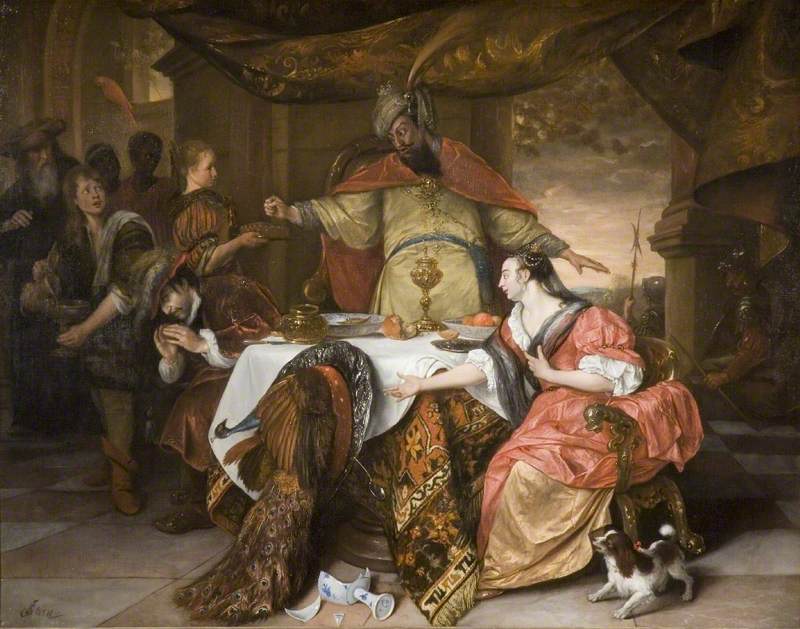Achashverosh's Shock and Fury
Introduction

Why So Surprised and Enraged?
Esther Chapter 7 contains one of the most dramatic scenes of the Megillah. In it, Esther pleas for her own life and the lives of her nation, finally revealing her identity1 and exposing Haman's plot to the king:
(ג) וַתַּעַן אֶסְתֵּר הַמַּלְכָּה וַתֹּאמַר אִם מָצָאתִי חֵן בְּעֵינֶיךָ הַמֶּלֶךְ וְאִם עַל הַמֶּלֶךְ טוֹב תִּנָּתֶן לִי נַפְשִׁי בִּשְׁאֵלָתִי וְעַמִּי בְּבַקָּשָׁתִי. (ד) כִּי נִמְכַּרְנוּ אֲנִי וְעַמִּי לְהַשְׁמִיד לַהֲרוֹג וּלְאַבֵּד וְאִלּוּ לַעֲבָדִים וְלִשְׁפָחוֹת נִמְכַּרְנוּ הֶחֱרַשְׁתִּי כִּי אֵין הַצָּר שֹׁוֶה בְּנֵזֶק הַמֶּלֶךְ.
(3) And Queen Esther answered and said, "If I have found favor in your eyes, the king, and if it pleases the king, let my life be given to me at my petition, and my people at my request. (4) For we have been sold, I and my people, to be destroyed, to be slain, and to be exterminated; had we only been sold as slaves and maidservants, I would have kept quiet, for the adversary is not worthy of the king's loss."
Achashverosh responds with seeming shock, asking: "מִי הוּא זֶה וְאֵי זֶה הוּא" – who is the person who dared conceive of such a plan? When Esther points to Haman, Achashverosh leaves the room in a rage, returns to find Haman begging for his life on Esther's couch, and orders the hanging of Haman.
How is one to understand the king's surprised and incensed reaction? How could he not have known that Haman was responsible for the plan? After all, Achashverosh had given his approval for it only a few days earlier,2 and even if at the time he had been unaware that Esther was a potential victim, he still should have now realized that Haman was the plan's architect!3 Moreover, considering that he himself had acquiesced, why is he so furious at Haman? Was not Haman (like the king), taken by surprise that the edict would impact Esther?4
Esther's Plea
Esther's plea is similarly perplexing. At first glance, it seems as if she is simply begging for mercy on the part of the king, in the hope that he will spare her and her nation. If so, though, why does she do so at a party to which she has also invited Haman! Moreover, although the king might have a personal interest in keeping her alive, if he truly wanted to annihilate her nation, why does she think that her begging will lead him to reverse the edict rather than simply issue a special royal dispensation for her? Finally, why does she mention the potential alternative of being sold into slavery ("וְאִלּוּ לַעֲבָדִים וְלִשְׁפָחוֹת נִמְכַּרְנוּ הֶחֱרַשְׁתִּי"); how does this strengthen her argument?
Haman's Original Petition
To better understand the conversation between Achashverosh and Esther, we must examine Haman's original request to annihilate the Jewish nation:
(ח) וַיֹּאמֶר הָמָן לַמֶּלֶךְ אֲחַשְׁוֵרוֹשׁ יֶשְׁנוֹ עַם אֶחָד מְפֻזָּר וּמְפֹרָד בֵּין הָעַמִּים בְּכֹל מְדִינוֹת מַלְכוּתֶךָ וְדָתֵיהֶם שֹׁנוֹת מִכׇּל עָם וְאֶת דָּתֵי הַמֶּלֶךְ אֵינָם עֹשִׂים וְלַמֶּלֶךְ אֵין שֹׁוֶה לְהַנִּיחָם. (ט) אִם עַל הַמֶּלֶךְ טוֹב יִכָּתֵב לְאַבְּדָם וַעֲשֶׂרֶת אֲלָפִים כִּכַּר כֶּסֶף אֶשְׁקוֹל עַל יְדֵי עֹשֵׂי הַמְּלָאכָה לְהָבִיא אֶל גִּנְזֵי הַמֶּלֶךְ. (י) וַיָּסַר הַמֶּלֶךְ אֶת טַבַּעְתּוֹ מֵעַל יָדוֹ וַיִּתְּנָהּ לְהָמָן בֶּן הַמְּדָתָא הָאֲגָגִי צֹרֵר הַיְּהוּדִים. (יא) וַיֹּאמֶר הַמֶּלֶךְ לְהָמָן הַכֶּסֶף נָתוּן לָךְ וְהָעָם לַעֲשׂוֹת בּוֹ כַּטּוֹב בְּעֵינֶיךָ.
(8) And Haman said to the king Achashverosh, "There is a certain nation, scattered and dispersed among the nations in all of the provinces of your kingdom, and their laws are different from other nations, and they do not keep the king's laws, and it is not worth it for the king to tolerate them. (9) If it pleases the king, let it be written that they be destroyed, and I will pay ten thousand talents of silver into the hands of those who do the work, to bring into the king's treasuries." (10) And the king removed his ring from his hand, and gave it to Haman son of Hammedata the Agagite, the enemy of the Jews. (11) And the king said to Haman, "The silver is given to you, and the people to do with them as is good in your eyes."
These verses raise a number of issues:
- "יֶשְׁנוֹ עַם אֶחָד" – Haman never explicitly mentions the Jewish nation by name; was it obvious about whom he was speaking, or is it possible that Achashverosh was unaware?
- "יִכָּתֵב לְאַבְּדָם" – Haman gives only a one sentence explanation of why the king should kill off the nation, speaking of how it differs from others and does not abide by the king's laws. Was this really sufficient to lead the king to approve of a plan to exterminate an entire nation?
- "וַעֲשֶׂרֶת אֲלָפִים כִּכַּר כֶּסֶף אֶשְׁקוֹל" – How should this monetary offer be understood? Is this a bribe to the king, a portion of the spoils, or compensation for the loss of tax revenues?
- Handing over the ring – As Achashverosh gives Haman his signet, he adds that the money is given to Haman and the people are his to do with them as he wishes. These actions suggest that Achashverosh approved of Haman's plot. Do they also suggest that Haman had free reign, or were there any limitations?
In Approaches, we will explore the range of options in understanding the dynamic between Achashverosh, Haman, and Esther.